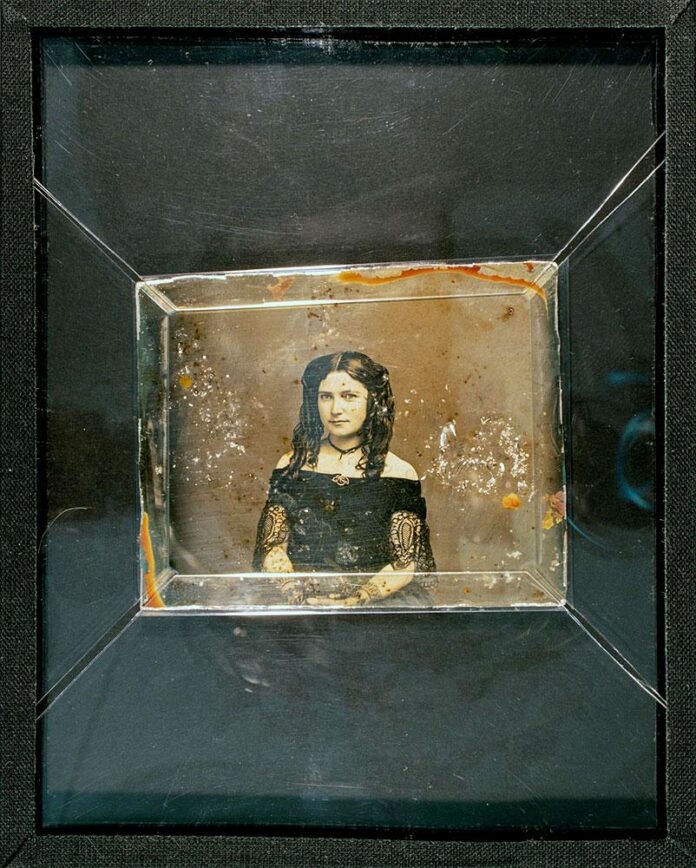Owing to her enigmatic smile, this unidentified woman was dubbed the Mona Lisa of the Deep after her haunting portrait was pulled from the wreckage of the S.S. Central America. Known as the Ship of Gold, the vessel sank in 1857 while carrying 10 tons of gold prospected during the California Gold Rush.
The portrait—a daguerreotype photograph—was one of 421 treasures from the shipwreck that were auctioned off by Holabird Western Americana Collections on March 4 and 5. Some 7,500 bidders from around the world flocked to the two-day live (and online) event for a chance at owning a piece of Gold Rush history, driving up the auction’s total to $1.1 million, far exceeding its pre-sale estimate of $375,000–$700,000. “This is the most famous of all gold treasures, with no comparable sales,” said Fred Holabird, president of the auction house.

Scale model of the S.S. Central America, made by W.G. Ballenger in 1991 and sold in the Holabird auction for $42,000. Courtesy of Holabird Western Americana Collections.
The S.S. Central America was a large steamer that sank in a hurricane off the Carolina coast in 1857 while carrying a massive haul of gold bullion and gold items from San Francisco to New York City via Panama. Recovery from the shipwreck site took place in several stages between 1988 and 1991, and again in 2014.
The highest selling item was a massive 32.15-ounce gold ingot created in San Francisco by prominent Gold Rush assayers John Glover Kellogg and Augustus Humbert. The gold bar weighing two pounds sold for $138,000 (premium included), far above its current gold content value of nearly $60,000. Of the 577 gold bars recovered from the S.S. Central America shipwreck, 373 were made by the Kellogg & Humbert firm.

The Kellogg & Humbert gold ingot pulled from the wreckage of the S.S. Central America. Courtesy of Holabird Western Americana Collections.
Historians have said the ship’s sinking contributed to the financial crisis known as the Panic of 1857 as banks in New York were depending on the shipment of gold. Not only did the Central America take about 30,000 pounds of gold down with her—gold ingots, freshly minted gold coins, and raw gold from the mines, as well as other valuables—she also took 425 of her 578 passengers and crew to their watery grave.
Other items included an 18-karat gold-quartz brooch that San Francisco businessman Sam Brannan—California’s first millionaire—was sending to his son in Geneva, Switzerland, as a gift to his teacher. The back is engraved “A. Roediger / from his little pupil / Sam Brannan Jr. / California.” It went for $49,200.

The Brannan brooch found in the S.S. Central America shipwreck of 1857. Courtesy of Holabird Western Americana Collections.
“This was an incredible time capsule of the California Gold Rush era,” said Holabird. “Many collectors were waiting for these extraordinary items to come on the market since the legendary, submerged ship was located in 1988 and Life magazine proclaimed it America’s greatest treasure ever found.”
Another recovered piece of jewelry was the “REGARD” ring, named for the first letter of each of the five gemstones it contains: a ruby (now missing), emerald, garnet, amethyst, another ruby, and a diamond. It would have been a gentleman’s pre-engagement token of affection for a lady. It sold for $14,400.

The “REGARD” ring. Courtesy of Holabird Western Americana Collections.
Still other treasures included a brass porthole from Captain Herndon’s cabin, unusual in that it could open, which went for $18,500. A “saloon” sign from the ship attracted a winning bid of $13,200. Six beer bottles, some still with their original contents, sold for an average of $1,087 each. Thirty-six Cuban cigars—seemingly brought on board when the ship stopped in Havana—were offered in 18 separate lots of two cigars each and sold for as much as $720. Even lumps of coal used to power the steamer on its voyage sold for hundreds to thousands of dollars each.
This was the second and final auction of artifacts from the S.S. Central America. The first auction of 270 lots in December 2022 included $114,000 for the oldest known pair of miner’s heavy-duty work jeans that may have been made by or for the Levi Strauss Company.
As for the Mona Lisa of the Deep, the restored metal-plate portrait retrieved from the sea floor in 2014 and given her Da Vinci-inspired moniker by the recovery team, her winning bid was $73,200.

























